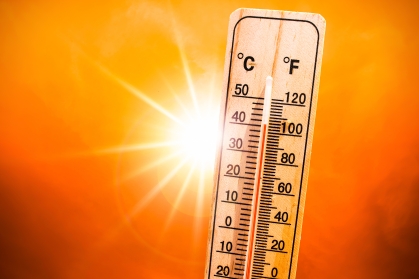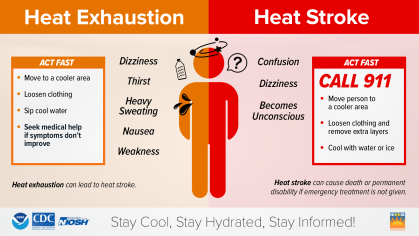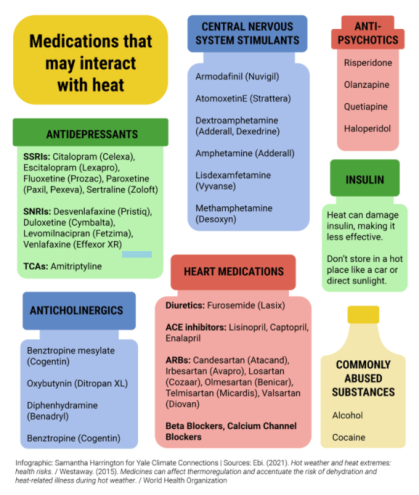Keep People with Disabilities Safe in the Summer Heat

Temperatures are rising in New Jersey! Do you know how to keep people with disabilities and chronic health conditions safe when the temperatures rise?
Remember that people with disabilities and people who take medications that interfere with the body’s heat regulation system are at higher risk for heat stroke and heat exhaustion. Does your loved one have a disability, such as MS or lupus, that increases their sensitivity to heat? It is important to know this information and plan accordingly. Plan ahead of time by asking doctors, nurses, and pharmacists if you or someone you care for needs to be extra cautious during the summer months.
What is heat exhaustion?
Heat exhaustion is the body’s response to an excessive loss of water and salt, usually through excessive sweating. Symptoms include headache, nausea, dizziness, and weakness.
What is heat stroke?
Heat stroke is the most serious heat-related illness. It occurs when the body can no longer control its temperature: the body’s temperature rises rapidly, the sweating mechanism fails, and the body is unable to cool down. When heat stroke occurs, the body temperature can rise to 106°F or higher within 10 to 15 minutes. Heat stroke can cause permanent disability or death if the person does not receive emergency treatment.
Symptoms include:
- Confusion, altered mental status, slurred speech
- Loss of consciousness (coma)
- Hot, dry skin or profuse sweating
- Seizures
- Very high body temperature
- Fatal if treatment delayed

If you begin to suspect heat stroke, go to an emergency room or call 911.
Medications that increase a person's risk for heat exhaustion and heat stroke:
- Those used to treat movement disorders (anti-Parkinson drugs, including Cogentin)
- Those used to treat allergies (antihistamines such as Benadryl).
- Diuretics (waterpills) such as Lasix (furosimide), bumetanide, hydrochlorothiazide.
- Those used to treat psychiatric conditions, including, but not limited to Clozaril (clozapine), Compazine (prochlorperazine), Elavil, Limbitrol, Triavil (amitriptyline), Haldol (haloperidol), Loxitane (loxapine), Phenergan (promethazine), Wellbutrin (buproprion), Zyrexa (olanzapine)

If you or someone you care for is seated in a wheelchair, wears braces, or uses mobility devices, they can also impact the body's ability to cool itself. People with spinal cord injuries are also especially at risk during high temperatures because of their inability to control their body temperature. Spinal cord injuries can lead to reduced sweating capacity, the body's natural way to cool itself off. Make sure those individuals remain adequately hydrated and that someone checks on them regularly.
People with mental health conditions are especially susceptible to heat. Sleep loss during periods of prolonged, extreme heat may be a contributing stressor for mental health conditions.
Cognitive disabilities, such as intellectual disabilities, Alzheimer’s disease and, dementia, can impact a person’s ability to comprehend symptoms and/or communicate the effects they are experiencing.
If you don't have access to air conditioning in the home, plan ahead of time where you can go if necessary to cool off. Assemble a list of nearby friends and family you can visit for a few hours. Find cooling stations in your area here or by calling 211. Consider public places like shopping malls, senior centers, and libraries.
In extreme heat, energy demands can lead to power outages. If you or someone you know requires electricity to power medical equipment or keep medication cool, make a plan for what to do if the power goes out. Also consider enrolling in Register Ready, New Jersey’s Special Needs Registry for Disasters. This register allows New Jersey residents with disabilities or access and functional needs and their families, friends, caregivers and associates an opportunity to provide information to emergency response agencies so emergency responders can better plan to serve them in a disaster or other emergency.
If running an air conditioner is a financial hardship, learn more here about the different assistance programs available to low and middle income New Jerseyans.

